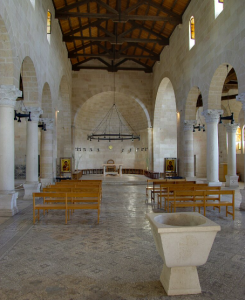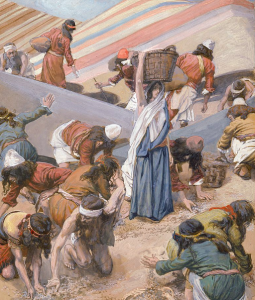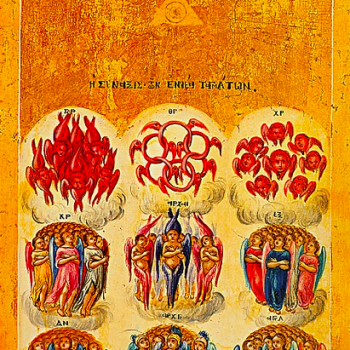Well, at Least Once, Anyway
I thought I had translated two other Gospels’ accounts of this miracle before—John’s last July, and Mark’s … at some point. In truth, I had bamboozled myself: Just before translating John’s account of the feeding of the five thousand,1 I translated Mark’s lead-in to this miracle, which by itself was our Gospel text for the Sunday before we started in on John.

Loaves and fishes from the Catacombs
of Callixtus (3rd century?).
This miracle is a remarkable one. It’s one of the few outside the Passion and Resurrection which all four Gospels, across the Synoptic-Johannine divide, record; it is also a favorite motif in primitive Christian art and patristic commentary, frequently receiving a eucharistic interpretation. Along with the other feeding (that of the four thousand, recorded in Matthew 15 and Mark 8) and the changing of the water into wine (John 2), I believe these are the Lord’s only culinary miracles—though the blasting of the fig tree lies adjacent on one side, and the institution of the Eucharist on the other. Let’s dig in.
Luke 9:11b-17, RSV-CE
Jesus welcomed the crowds2 and spoke to them of the kingdom of God, and cured those who had need of healing. Now the day began to wear away; and the twelve came and said to him, “Send the crowd away, to go into the villages and country round about, to lodge and get provisions; for we are here in a lonely place.” But he said to them, “You give them something to eat.” They said, “We have no more than five loaves and two fish—unless we are to go and buy food for all these people.” For there were about five thousand men. And he said to his disciples, “Make them sit down in companies, about fifty each.” And they did so, and made them all sit down. And taking the five loaves and the two fish he looked up to heaven, and blessed and broke them, and gave them to the disciples to set before the crowd. And all ate and were satisfied. And they took up what was left over, twelve baskets of broken pieces.
Luke 9:11b-17, my translation
And [Jesus], having welcomed the [crowds], talked to them about the kingship of God, and those who had need of medical aid, he healed.

The day began to slant; so the Twelve came and said to him: “Dismiss the crowd, so that they may journey to the circle of villages and fields to stop in somewhere and find provisions, because this place where we are is a desert.” But he said to them, “You give them something to eat.” So they said, “There is nothing more among us than five loaves of bread and two fish, unless we are to journey to buy food for this whole people.” For something like five thousand men were there.
He said to his students: “Make them take seats, in something like fifties.” And they did just that and made them all take seats. Taking the five loaves of bread and the two fish, he looked up into heaven, blessed them, and broke them up, and gave them to his students to put before the crowd. And all they ate and were full, and twelve baskets picked up the overflow from their broken pieces of bread.

The nave and sanctuary of the Church of
the Multiplication, the traditional site
of this miracle in the Galilee.
Photo by Berthold Werner.
Textual Notes
a. the kingdom of God/the kingship of God | τῆς βασιλείας τοῦ θεοῦ [tēs basileias tou theou]: The distinction between kingdom and kingship is subtle, but less subtle than it may seem. Really, kingship is a rather imperfect way of conveying the real implications of the suffix -εία [-eia]; it tends to imply action considered as a thing. Accordingly, if there were such a verbal noun, “kinging” would be better.
b. Now the day began to wear away/The day began to slant | Ἡ δὲ ἡμέρα ἤρξατο κλίνειν [Hē de hēmera ērxato klinein]: I love this idiom, “the day began to slant”—it’s so visible in the imagination. The verb I’ve translated “slant,” which the RSV renders “wear away,” is κλίνω [klinō]. Its most literal rendering is probably “to recline,” and it does a surprising amount of work in this passage, because, besides it taking place in the afternoon or early evening, it was then customary to recline rather than sit while eating (both the RSV and I translated it in forms of “to sit” just a few verses further down).
c. to lodge/to stop in | καταλύσωσιν [katalüsōsin]: This verb, a form of καταλύω [katalüō], is a strange one to English speakers: Its primary and tertiary meanings are “destroy, dissolve, abolish” and “cast down, overthrow,” while its secondary meaning is “be a guest, lodge”! The closest approximation I could come up with that was somewhat consistent with both meanings was “stop,” since “stopping somewhere” can idiomatically mean staying there temporarily, but, like most verbs of interrupted motion, it can also be used to suggest death or ruin.

d. We have no more/There is no more among us | Οὐκ εἰσὶν ἡμῖν πλεῖον [Ouk eisin hēmin pleion]: We know from John 6 that the five loaves and two fish were actually offered by a little boy from the crowd; I’m sure Luke here is doing nothing more than telescoping the information a little bit, but I can’t help but be amused at the resulting mental picture of the Twelve just commandeering the poor kid’s lunchbox.
e. for all these people/for this whole people | εἰς πάντα τὸν λαὸν [eis panta ton laon]: This phrase reminded me of Moses striking the rock to obtain water for the Israelites, and at first I couldn’t think why. I think it is because of the word λαός [laos] (of which λαὸν is a form). This word can mean “people” or “nation” in general, but it is applied especially to God’s chosen people; this is why it is the root of the English term laity.
f. Make them sit down in companies, about fifty each/Make them take seats, in something like fifties | Κατακλίνατε αὐτοὺς κλισίας ὡσεὶ ἀνὰ πεντήκοντα [Kataklinate autous klisias hōsei ana pentēkonta]: The initial verb there, a form of κατακλίνω [kataklinō], is one of those verbs with a preposition stuck onto it—Greek, like both English and Latin, loves to do this (the line between prepositions and adverbs, which can both answer the question “where?”, is fine-to-nonexistent in several Indo-European languages). This also happens to be a verb that is what we might call “optionally causative,” an option Luke’s author went with here: in other words, the verb can mean either “to do X” or “to cause to do X.”

The Gathering of the Manna (1902),
by James Tissot.
The allusion to “fifties”—which, if women and children were counted, probably came to something more like a couple hundred, varying in either direction by as much as a few dozen—may seem mundane at first, since fifty is not a particularly symbolic number in most of Scripture. If it has a symbolic importance, I suspect that importance lies in what we get by doing a little basic math: namely, the fact that there were therefore ten of these fifties. Ten (albeit less so than seven and and twelve) was a number that symbolized perfection; in particular, it represented moral perfection, whether the perfection taught by the Torah or that attained by complete observance of the Torah.
g. were satisfied/were full | ἐχορτάσθησαν [echortasthēsan]: This verb (a form of χορτάζω [chortazō], “to feed, fill up, stuff; to fatten”) is also a funny one in my opinion, just because it almost sounds like an onomatopoeia.
Footnotes
1Which was in reality a feeding, probably, of anywhere from fifteen to twenty-five thousand, since women and children were not counted but (as we know from John) were also present in some number.
2This is not the exact wording of the RSV in context; our reading picks up in the middle of verse 11, so the original RSV-CE text has “he” and “them” rather than “Jesus” and “the crowds.”












